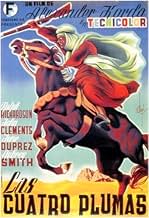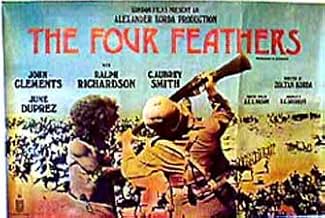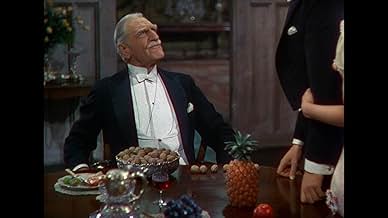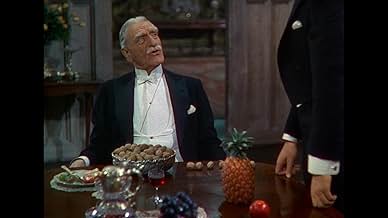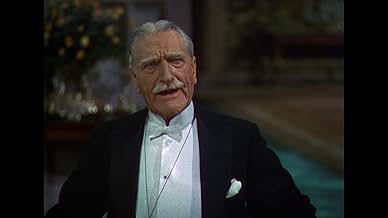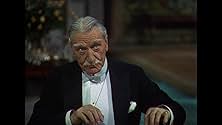A British Army officer resigns, burning his last-day summons to war in the Sudan. Accusing him of cowardice, his girlfriend and three friends give him white feathers. To gain redemption, he ... Read allA British Army officer resigns, burning his last-day summons to war in the Sudan. Accusing him of cowardice, his girlfriend and three friends give him white feathers. To gain redemption, he shadows his friends to save their lives.A British Army officer resigns, burning his last-day summons to war in the Sudan. Accusing him of cowardice, his girlfriend and three friends give him white feathers. To gain redemption, he shadows his friends to save their lives.
- Awards
- 1 win & 2 nominations total
- Man
- (uncredited)
Featured reviews
This is the best version of A.E.W Mason novel and contains a plethora of adventures , heroism, a love story and breathtaking battles. John Clemens as brave hero is memorable and Jane Duprez as gorgeous heroine is charming . Ralph Richardson as the blind comrade is awesome . Touch of humor is supplied by C. Aubrey Smith as the resourceful veteran military . Special mention to cinematography in a colorful and glimmer Technicolor at charge of George Perinal . Spectacular musical score by the classic musician Miklos Rozsa . The film has been magnificently realized by Korda brothers , Zoltan (direction) , production design (Vincent) and production (Alexander Korda). Other versions of Mason novel are ¨Storm over the sand¨ (1955) by Terence Young with Laurence Harvey, Anthony Steel and Mary Ure ; 1977 Television remake with Beau Bridges , Robert Powell and Jane Seymour and last adaptation (2000) by S. Kapoor with Heath Ledger , Wes Bentley and Kate Hudson . The motion picture will appeal to adventure genre fans and classic cinema enthusiasts .
There is very little to fault The Four Feathers. It has truly evocative location work, sweeping cinematography and rich bold colours that still look amazing. The script is tight, the story is epic and always compelling and the film is perfectly paced with some great action. Miklos Rosza's score is just outstanding, easily up there as one of his best, while Zoltan Korda directs beautifully, and the acting of John Clements, Ralph Richardson and C.Aubrey Smith is excellent.
Overall, this film is a must see for so many reasons especially for its wonderful visuals and score. 10/10 Bethany Cox
June Duprez is the scornful woman, pretty as a picture in the only feminine role. Uncharismatic British actor John Clements is only adequate as the man who receives the "four feathers" and must redeem himself--but Ralph Richardson has the most memorable scenes as the sun-struck soldier who loses his helmet under the blazing sun and is blinded. Many gripping scenes as the hero undertakes a long journey to the Sudan.
Handsome Alexander Korda production rightfully deserves its ranking as a screen classic of 1939, but I have to say it's not without its faults as far as the structure of the story goes.
First of all, too much time is spent on hundreds of extras in battle scenes that become repetitious after awhile and interrupt the flow of the story and what is happening with our hero. Furthermore, the actor chosen for the "stiff upper lip" role of Haversham is John Clements, and much of his performance is too stiff to come alive. A more appealing and charismatic actor from that era would have sufficed and made the story stronger. Thirdly, there's a hint of incredibility in the tale of a man who would go to such extremes to regain his honor and go on a mission in which he would be reunited with the very men who scorned him. A bit much in the realm of credibility, but it does make a good story.
Summing up: Good adventure tale in which C. Aubrey Smith has one of his most memorable character roles as a stuffy "Colonel Blimp" type of career soldier recounting his favorite war tales.
The Technicolor photography is eye-poppingly rich, at the same level as three other 1939 color classics—namely, Gone with the Wind, The Wizard of Oz and Drums Along the Mohawk. Particularly effective are the transitions from the browns and yellows of North African military outposts, with their punctuations by the red, white and blue of the Union Jack, to the deep greens of rural England. To top it off, much of the film was actually shot in the Sudan with what seems like thousands of native extras. By looks alone, sometimes it's hard to believe that this production predates the Second World War. It might have been a huge hit if it had had a Cary Grant or a Clark Cable or an Errol Flynn in the lead. As things go, John Clements is as good as can be, if not exactly bursting with charisma. Ralph Richardson gives a bravura performance as Clement's fellow officer, though he is saddled with a sequence that strains credulity beyond the breaking point. Let's just say that it takes a physically fit man longer than 30 seconds of direct exposure to the desert sun before he suffers total disorientation and unconsciousness. And if the sun can do that much damage so swiftly, then surely the flesh of the unconscious man's face, exposed for hours, would be cooked to a cinder.
C. Aubrey Smith plays his usual crusty old Brit, this time as a bombastic Crimean War veteran who complains that men are no longer men and war is no longer war. His repetitious boasting wears thin after a while. June Duprez barely registers as the female love interest.
Did you know
- TriviaDirector Zoltan Korda's own remake of this film, Storm Over the Nile (1955), re-used a lot of the battle sequences from this movie, which did not lend themselves very well to the cropping necessary to achieve the width of the CinemaScope ratio, nor did their comparative fuzziness blend well with the new footage.
- GoofsWhen General Burroughs is talking in the garden with Ethne, his swagger stick reverses ends.
- Quotes
Harry Faversham: In England, the white feather is the mark of a coward.
Dr. Harraz: Ah, I see. Then why worry? Be a coward and be happy.
Harry Faversham: No, Doctor. I have been a coward, and I wasn't happy.
- Crazy creditsOpening credits prologue: In 1885 the rebellious army of cruel dervishes enslaved and killed many thousands of defenceless natives in the Sudan, then laid siege to Khartoum. The scanty garrison's heroic commander, General Gordon appealed for help from England - but no help reached him.
- ConnectionsEdited into Storm Over the Nile (1955)
- SoundtracksAuld Lang Syne
(1788) (uncredited)
Lyrics by Robert Burns, music traditional
Heard during the departure of the Regiment
Details
- Runtime2 hours 9 minutes
- Aspect ratio
- 1.37 : 1
Contribute to this page



